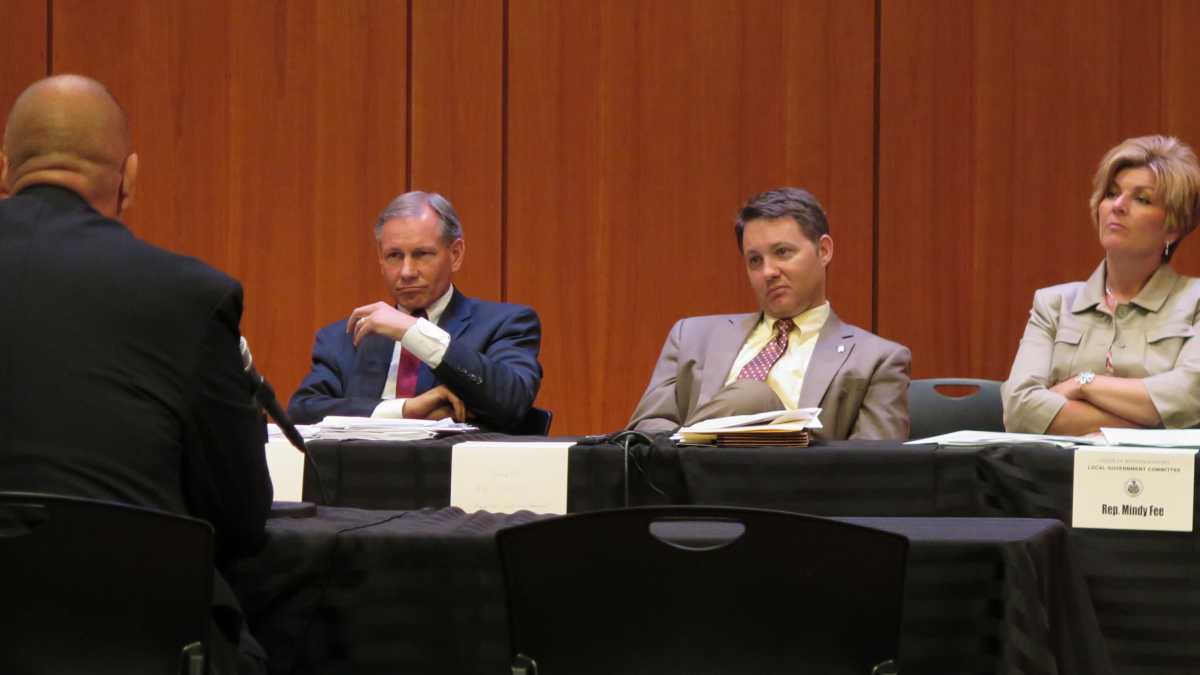Capitol recap: what Harrisburg’s parking situation means for the rest of Pennsylvania

State Senate Local Government Committee Chairman John Eichelberger, R-Blair/Cumberland, and Minority Chairman Rob Teplitz, D-Dauphin, with Rep. Mindy Fee, R-Lancaster, at a meeting in 2014. Eichelberger, Teplitz and state Sen.'s John Blake, D-Lackawanna, and Mike Folmer, R-Lebanon, are sponsoring five bills aimed at better regulating local public debt. (Emily Previti/WITF)
Some state lawmakers want to prevent other cities from accumulating the degree of debt that ultimately increased parking costs in Pennsylvania’s capital.
Mild reprieve is imminent:
Harrisburg parking rates on Saturdays and during weekday happy hours are expected to drop in designated areas downtown later this year.
The news was a highlight of the Harrisburg Parking Advisory Board’s quarterly update presented Tuesday night.
Less than 48 hours later, state Sen. John Eichelberger, R-Blair/Cumberland, addressed the Harrisburg Regional Chamber of Commerce about the wider issue:
There’s not much stopping local public officials from over-extending themselves – and the taxpayers they affect – as Harrisburg once did.
The city and its authorities had racked up about half a billion dollars of debt by the time the recession hit, rendering them almost immediately unable to cover repayments. Facing bankruptcy, the municipality ultimately figured out a way to repay creditors. The deal entailed selling its incinerator, leasing its parking assets and increasing earned-income taxes.
Privatization isn’t the sole culprit behind the hiked parking costs– they’re needed to cover repayments of new debt taken on by a public-private partnership (the state, a financier and a real estate corporation) and used to settle up with the city’s former creditors.
Eichelberger says it’s not exactly that there are Harrisburgs waiting to happen all over Pennsylvania (that he’s aware of) – but he concedes the state’s financial regulations are “loose” compared to other states.
That’s why, he explains, it’s been nearly two years without a full Senate vote since he and three other legislators first introduced preventative bills.
“The financial community had a sweet deal in Pennsylvania, and didn’t want to give it up,” Eichelberger says.
That, and lawmakers had to make sure the potential state regulations didn’t conflict with federal law, he says.
Here’s some of what five bills propose:
• Make it a second-degree misdemeanor for financial advisers to willfully misrepresent information to the state Department of Community & Economic Development, which reviews all debt issuances proposed by public schools and local governments and their authorities. A conviction means up to $5,000 in fines and two years in prison, as well as a mandatory ban on doing business with the public body whose books were cooked (but not others).
• Make DCED’s process more rigorous than the “rubber-stamp” procedures in place before, Eichelberger says. Prospective borrowing agencies would pay more to fund increased scrutiny by the department, which has watched its budget drop to less than half its amount eight years ago.
• Keep debt proposals submitted to DCED for five years – versus just four months requirement in place now. Eichelberger says the lack of documents frustrated investigations into Harrisburg’s financings, potentially preventing criminal charges from being filed (at least thus far). Both the federal Securities and Exchange Commission and state Attorney General’s office have looked into the matter.
• Make it clear that municipal authority officials are under the purview of the state Ethics Commission. This would bolster the commission’s power in probing agencies like The Harrisburg Authority, which was the agency that actually issued most of the debt (the city guaranteed it).
• About the guarantees: public schools and local governments and their authorities would not be able to take cash for guaranteeing of one another’s debt (analogous to co-signing). Bills also would require more public notice of the guarantees – on both ends, so taxpayers know their elected officials are putting them on the hook for something that’s not directly (or at all) beneficial.
• Require public bodies to issue quarterly reports at their regular meetings on the performance of any interest-rate swaps they’re engaged in. The risky financial instruments would have been banned in the legislation as originally drafted, but public finance pros complained. They pushed instead for rules that promote responsible management of the sophisticated agreements, and won out over those who argued swaps amount to gambling with taxpayer money.
WHYY is your source for fact-based, in-depth journalism and information. As a nonprofit organization, we rely on financial support from readers like you. Please give today.



